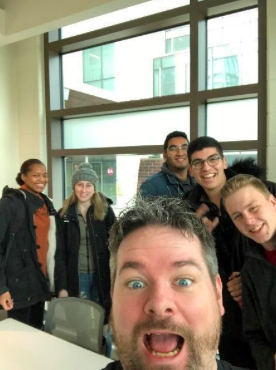The pandemic has been a learning laboratory for business schools across Canada

Lorenzo Somma has a double identity. He is both an entrepreneur and a business student at the McKeil School of Business at Mohawk College. This semester is his last one in a three year business administration program.
“I started my own business about 10 years ago, and one thing led to another and here I am back in school again,” he said. “The reason I am attending the business program now was because I want to learn the knowledge of how to successfully run the businesses.”
Somma owns two businesses that were greatly affected when the pandemic struck. One of his businesses was developed to bring people together to engage in gaming activities. With lockdown measures, the customers could no longer meet at the venue. Somma had to change the business model entirely and move to online play.

Natasha Hillman; Mohi Ahmed; Bilal Ziyad Khaleel; Colin Bassindale on Jan. 30, 2020.
(Photo Credit: Lorenzo Somma)
After the switch, he lost many customers. Fortunately, he has been applying the knowledge that he learnt from the last two and a half years in his business program to adapt, and identify market trends and opportunities.
“In this case, many people have been forced to use online activities for entertainment and engagement during the pandemic,” said Somma. “The business classes that I engaged with online have given me insights into the dos and don’ts of maintaining attention from viewers for long periods of time. This is the perfect time to get an online business up and running.”
Professors had to pivot their teaching methods to provide a more accurate learning experience due to COVID-19. They used real-time cases that happened during the pandemic.
James Fowler, an entrepreneur professor at the McKeil School of Business, has had to adapt his teaching methods to fit the current economic situation.
“It wasn’t an easy process. The sudden change to online teaching has been a big challenge for many business schools.” Fowler says. “But, with time to plan, online teaching will allow lecturers to focus on what activities best suit the business education subject and design them to fit. My focus is to deliver the course materials to students in a real, interactive and meaningful way.”
But not all online learning experiences have been positive. Somma said a few of his professors are not adjusting well due to lack of online and technical expertise. This has been a common situation with business schools among universities and colleges.
“It’s just like every other business school across Canada, the whole story is the same,” Anne-Marie Croteau, the dean of John Molson School of Business at Concordia University, said.
“I think our online delivery is not perfect, it is far from being perfect. We piled on to remote teaching within a week, we made this decision as soon as possible. But we weren’t quite quick enough to consider the effect of making the decision that we would be going online.”
Similar to Mohawk College, the John Molson School of Business at Concordia University also provided a live case on crisis management during the pandemic. The school takes the pandemic as a scenario and has turned it into a learning opportunity. Within a few weeks, the John Molson School of Business Executive MBA (EMBA) program created an expert-driven school curriculum that includes content from an epidemiologist, business representatives from different sectors, and news editors.
However, Bernard M. Wolf, professor emeritus of Economics and International Business at the Schulich School of Business, thinks business schools have adapted well.
“What this has done is really provided a laboratory for them to see the business school faculties, to see what works and what doesn’t work virtually. I think universities have adopted or are adapting to virtual teaching so quickly.” Wolf said.
“Except all the technical challenges, there were some other unanticipated problems that almost nobody could have planned for until you get into it,” said Joanne McNeish, associate professor at Ryerson University’s Ted Rogers School of Management.
McNeish said that an example of this is the fact that some professors have to multitask, working from home and taking care of their children at the same time due to daycare closures.
“You can imagine how difficult it could be. So I think the business schools have done a great job. They’ve done the best they could do in such uncertain circumstances,” said McNeish.
CarringtonCrisp and European Foundation for Management Development (EFMD) have been running the GenerationWeb study for 13 years, but this year the study was adapted to reflect student views on their online learning experience. According to the study, 71 per cent of students agree that their school has made quick changes to address issues brought on by the pandemic. Additionally, 66 per cent of students think that their school is handling the transition to remote teaching well.
As Croteau said, “I would say that during this pandemic, we’ve learned that people are extremely resilient, the faculty members, the staff members, they amaze me. I speak for all in my own school right here, right now…remain extremely engaged and try your best and do your best.”
